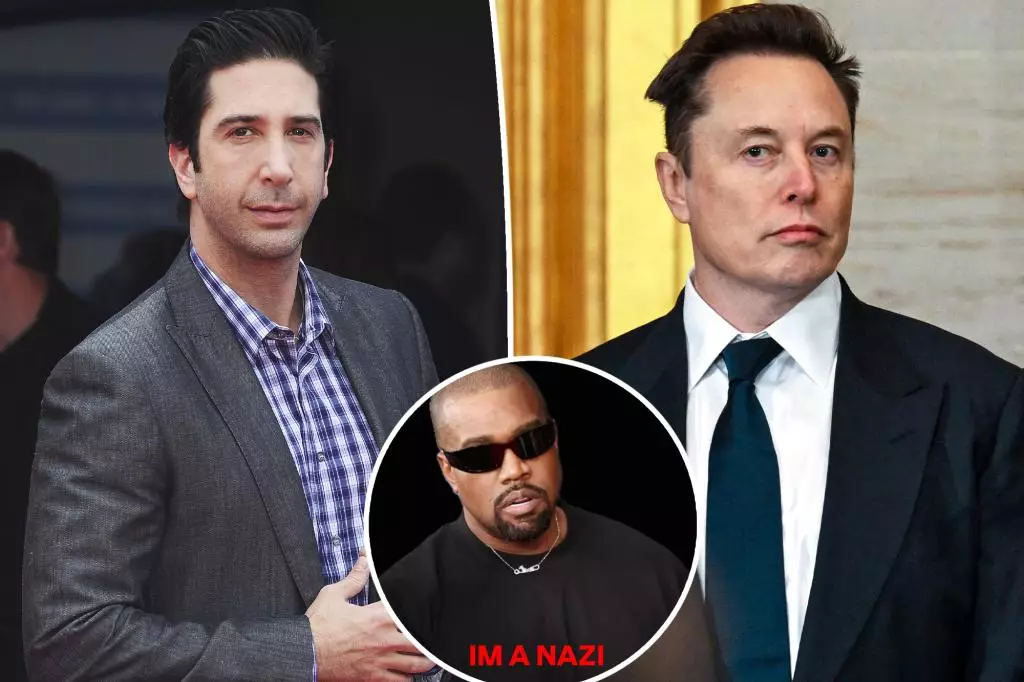In a world where social media reigns supreme, the actions of public figures can have far-reaching consequences. Recently, David Schwimmer, the well-known actor from the iconic television show “Friends,” spoke out against Kanye West, now known as Ye, after the rapper shared a series of deeply offensive and antisemitic tweets. Schwimmer’s heartfelt plea to Elon Musk, the owner of the platform X (formerly Twitter), has highlighted an important discussion about the responsibilities that come with fame and the need for active measures against hate speech.
Celebrities like Kanye West wield a tremendous amount of influence over their followers. With 32.7 million people following him on X, his words can incite either constructive dialogue or destructive behavior. Schwimmer’s concerns underscored the potential dangers of allowing any individual to promote hateful rhetoric without consequence. When West stated, “I don’t like or trust no Jewish person,” he crossed a line that should not be tolerated in any society that values equality and justice.
Schwimmer articulated the potential real-world harm that such hate speech can foster. The accusation that West’s rhetoric could lead to violence against not only the Jewish community but other marginalized groups is a serious matter that warrants attention. Moreover, Schwimmer expressed frustration with the mixed reactions to West’s comments, suggesting that the lack of outrage could compound the problem. This sentiment of “silence is complicity” serves as a reminder that by not speaking out against hate, society implicitly condones it.
The Dangerous Path of Public Indifference
The issues raised by Schwimmer and the fallout from West’s tweets remind us of the consequences of public indifference. Ye has previously made headlines for highly controversial statements, including an earlier ban from X following posts that included swastikas and other disturbing images. However, he returned to the platform, seemingly undeterred by the fallout. This ongoing cycle of outrageous behavior followed by temporary consequences raises questions about the effectiveness of current practices in moderating hate speech online.
The grievance West expressed—that there exists an anti-White sentiment among Jewish individuals, among other baseless stereotypes—feeds into harmful narratives that have long been used to justify discrimination and violence. Such claims not only lack merit but also contribute to the continuing cycle of scapegoating in society. They force marginalized communities to defend themselves against unfounded accusations at a time when unity and understanding are desperately needed.
The digital age presents a peculiar challenge: while access to information has expanded exponentially, so has the dissemination of misinformation and hate. Schwimmer’s call to action highlights the need for social media platforms to exercise more responsibility when it comes to monitoring the content shared by their users, especially prominent figures like Kanye West. Platforms must recognize the cultural and historical significance of the words they allow to circulate; unchecked rhetoric can revive harmful ideologies and factions that society has worked diligently to dismantle.
For the sake of society’s moral compass and the well-being of vulnerable communities, it’s crucial for influential figures to understand the weight of their words. No longer can they act with impunity, using a platform to amplify hate speech and perpetuate damaging stereotypes. The responses, or lack thereof, from both ordinary users and social media executives will shape the future landscape of digital discourse.
In light of these events, collective action is essential in pushing back against hate speech and fostering a climate of accountability. Individuals must not only express their dissent against such rhetoric but also use their voices and influence to promote understanding and dialogue. Activist groups, alongside responsible influencers, can play a pivotal role in redefining the narrative and ensuring that hate does not go unchallenged.
As Schwimmer suggested, the ownership of social media platforms must recognize their role in the societal discourse and take decisive steps to limit the reach of those who choose to spread hate. The fight against bigotry and ignorance must begin with awareness and a collective commitment to fostering a more inclusive and compassionate world. In doing so, we can ensure that the megaphones of our time echo messages of tolerance rather than hate.
